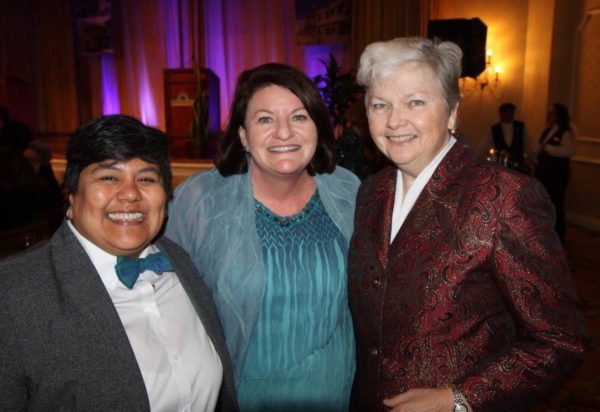News
California Sen. Toni Atkins’ cultural (r)evolution
Atkins cites “Anita Hill moment” in advance of historic Pro Tem swearing-in


California Sen. Toni Atkins (Photo by Karen Ocamb)
When Toni Atkins is sworn in as the first woman and first LGBT Senate President Pro Tem in California history today (Wednesday, March 21), the applause will mark a moment of change more profound than many may notice. The gathering momentum of a cultural revolution is apace, led now in Sacramento by a measured, down-to-earth, thoughtful and compassionate lesbian who is unafraid to mete out justice when necessary.
This is a critical moment, Atkins tells the Los Angeles Blade. And while Atkins’ place in history is being widely acknowledged, including that she is only the third person to lead both the Assembly and the Senate, the significant cultural difference before and after Atkins’ swearing in will be felt as women start feel safe at work in the Capitol and harassment is everyone’s concern.
Atkins starts off with back up. On Feb. 19, Atkins endorsed Lt. Gov. Gavin Newsom for governor. “Gavin understands housing affordability is a foundational issue that links all others,” she wrote on her Facebook page. “I look forward to working with him to create more housing at all income levels.”

The respect is mutual. “Toni’s making history as the first woman and LGBTQ Pro Tem, but what makes her extraordinary is her authenticity, intellect and compassion. I have every expectation that she is going to be one of California’s great Senate leaders. She’s the right Pro Tem at the right time,” Newsom tells the Los Angeles Blade.
Now but a blip in memory, Atkins had a taste of gubernatorial power for part of the day on Wednesday, July 30, 2014 when the governor, lieutenant governor and state Senate president pro tem were all out of town and Atkins, who became Assembly Speaker two months earlier, briefly served as acting governor. Atkins thus became the first openly LGBT person to serve as California governor. “If Gov. Brown wants a few more days away I’m here for him!” Atkins said.
Humor, humility and toughness have served Atkins well on her 55-year journey from an impoverished childhood in Appalachia Virginia to the halls of power in Sacramento.
“Personally, that I would be able to do this, given where I come from and my beginnings, it’s really kind of amazing and very humbling,” Atkins tells the Los Angeles Blade on the eve of making history, again. “But as it relates to my being a member of the LGBTQ community, there are a lot of people who made it possible for me to be the first LGBTQ Senate President Pro Tem—starting in my mind with Chris Kehoe who gave me this incredible opportunity to get started in public service and elective politics.”
Atkins landed in San Diego in 1985 after securing a BA in political science from Emory and Henry College, and attending the John F. Kennedy School of Government at Harvard University. She joined Womancare Health Center before signing on with Kehoe after she won a San Diego City Council seat in 1993, a first for an LGBT candidate in the conservative area. Atkins served as her representative and policy analyst for years and when Kehoe was elected to the state Assembly, Atkins won the seat in Nov. 2000.

Georgette Gomez, Toni Atkins, Chris Kehoe Oct. 2017 (Courtesy the San Diego LGBT Community Center Facebook page)
Ten years later, Atkins was elected to the State Assembly, the same year LA Assemblymember John A. Perez made history by becoming the nation’s and California’s first openly gay Assembly Speaker. Two years later, Perez made Atkins majority leader and two years after that, he designated Atkins to be his successor as Speaker of the Assembly—making more history by having two out LGBT people in a row serve in that august position. LGBT ally Pro Tem Kevin de León designated Atkins as his successor, as well.
“As long as I’ve known Toni Atkins, I have known her to be a fierce and tireless public servant, I have no doubt that she will be an excellent Senate Pro Tem,” Speaker Emeritus Pérez tells the Los Angeles Blade. “I am very proud that this day has come and even more excited to see my friend Senator Toni Atkins take her place in history,”
“Toni is a class act and will bring her down-home focus and style of leadership to incredibly important work our State Senate faces this year. I am sure I’ll be more than a little bit misty-eyed as I watch her take the oath,” Eric C. Bauman, the first out Chair of the California Democratic Party, tells the Los Angeles Blade.
Already known as a coalition-builder, Atkins has pledged to work with Assembly Speaker Anthony Rendon, who had a tense relationship with de León.
And there is the possibility of coalition work with Senate Republican Leader Patricia Bates of Laguna Niguel, who has offered to work with Atkins “to substantially address the issues raised by reports concerning inappropriate behavior,” according to the LA Times, such as allegations of sexual harassment that have rocked the Capitol.
And here’s where the clapping and the congratulatory kiss with her wife, Jennifer LeSar, mark the change in how things are done in the State Capitol, at least on the Senate side.
Atkins has taken up the cause of the 140 women—legislators, lobbyists, advisors and staffers—who signed the “We Said Enough” letter letter calling out the “pervasive” culture of sexual harassment and misconduct in state government where “dehumanizing behavior by men in our workplace” is swept under the rug.
As a result of pressure from the #MeToo movement, Los Angeles-area Democratic Sen. Tony Mendoza resigned instead of facing an expulsion vote over sexual misconduct allegations.
“I want to focus a little bit internally on the Senate,” says Atkins. “I want to work on our policies and procedures so that everyone who comes into this building feels like it’s a safe place to be and to work.
“But it’s bigger than that,” she continues. “We have an opportunity because of the women who stepped forward—I think it started with the election in November when we got a new president and women at some point just said ‘We’ve had enough! We’ve absolutely had enough of this kind of treatment’ and they were courageous and they stepped forward. And I think we have an incredible moment in time that I want to make sure we don’t lose.”
And by turning a spotlight on the parallel track of women’s treatment—too often invisible to or ignored by the male eye—Atkins intends to turn the moment into sustainable action that will invariably change the culture. That clapping is a call to arms, to a feminist revolution accomplished through evolutionary measures.

Toni Atkins, 2006 (Photo courtesy Rex Wockner)
Atkins calls it the “Anita Hill moment”— when professor Anita Hill stepped forward in 1991 to accuse then-Supreme Court nominee Clarence Thomas of sexual harassment. Hill, says Atkins, “tried to point out that there is harassment, discrimination, and a different kind of treatment of women in the workplace. And you what—she wasn’t successful. And I think it caused women to run back in the shadows and into the closets on the issues of harassment in the workplace. I think women, as a group, we felt like we couldn’t risk our families, our careers and our jobs because a very, really powerful woman tried to address the issue and failed.”
But that was then. Now, “historically, we have a moment where we can actually, really try to make real change. And we have a role to play in the Legislature and in the Senate, which I will lead, to change the culture. I have a goal to focus internally, to try to work on something that will resonate as big as any piece of legislation can. We can change laws, and we can change regulations, and we can do bills but the real change takes place one person at a time within ourselves to change culture. So we’re trying to change a culture that has existed always.”
Yes, Atkins, will continue to bring her own bills and help other legislators with their legislation. “But if we can actually work on this piece, all of the pieces of law we put into place—whether it’s fair pay, or workplace equality—all of those things will be really so much further advanced if we address the issue of culture change that’s needed,” she says. “We have ‘a moment’ to really, really try to make some change or understand the impact from a greater scale.”
And that work will also support other issues as California is under attack by the Trump administration. “We will defend the people in California—whether we are talking about the transgender community, gender identity—or whether we’re talking about protection for immigrants. These are our residents. These are our citizens. And we are going to do everything we can,” Atkins says. “Society and our views are changing and California is a state, I believe, that is about the future and setting the trend for policies and procedures that Californians believe, and more and more Americans believe every day.”
“Toni Atkins is one of the most effective lawmakers in California and a true leader for the LGBTQ community,” says Human Rights Campaign President Chad Griffin. “We congratulate Senator Atkins on this historic achievement and look forward to the bright future for Californians under her leadership.”
And then there’s Atkins the role model.

US House Minority Leader Nancy Pelosi, Houston Mayor Annise Parker and Sen. Toni Atkins (Photo by Karen Ocamb)
“Both LGBTQ people and women are severely underrepresented in government— especially in high-level leadership positions—so I am thrilled Toni Atkins is now the California Senate’s President pro Tempore,” former Houston Mayor Annise Parker, President & CEO of LGBTQ Victory Fund, tells the Los Angeles Blade “Toni is an authentic, values-driven leader who remembers her Appalachian roots and enters the Capitol each day eager to improve the lives of all Californians. She takes on bold initiatives many politicians avoid—including healthcare and housing for those most vulnerable—and that political courage will spark creative and productive legislative solutions in the state Senate. Both California and the nation will benefit tremendously from Toni’s leadership.”
El Salvador
La marcha LGBTQ+ desafía el silencio en El Salvador
Se realizó el evento en San Salvador bajo la lluvia, pero con orgullo

SAN SALVADOR, El Salvador — El reloj marcaba el mediodía cuando los primeros colores del arcoíris comenzaron a ondear frente a la emblemática Plaza del Divino Salvador del Mundo. A pesar de la incertidumbre generada en redes sociales, donde abundaban los rumores sobre una posible cancelación de la marcha por la diversidad sexual, la ciudad capital comenzaba a llenarse de esperanza, de resistencia y de orgullo.
Este año, la Marcha del Orgullo LGBTQ+ en El Salvador se desarrolló en un contexto tenso, en medio de un clima político que reprime y silencia a las voces disidentes.
“Aunque las estadísticas digan que no existimos, viviendo en El Salvador, un país donde hoy, después de décadas de avances, defender los derechos humanos es de nuevo una causa perseguida, criminalizada y silenciada”, afirmaron representantes de la Federación Salvadoreña LGBTQ+.
A pesar de la cancelación del festival cultural que usualmente acompaña la marcha, los colectivos decidieron seguir adelante con la movilización, priorizando el sentido original de la actividad: salir a las calles para visibilizarse, exigir respeto a sus derechos y recordar a quienes ya no están.
A la 1:30 p.m., una fuerte lluvia comenzó a caer sobre la ciudad. Algunas de las personas presentes corrieron a refugiarse, mientras otras, debajo de sombrillas y de los escasos árboles en la plaza, decidieron mantenerse firmes. Los comentarios pesimistas no se hicieron esperar: “a lo mejor la cancelan por el clima”, “no se ve tanta gente como otros años”. Sin embargo, lo que siguió fue una muestra de resistencia: a las 2:05 p.m. las voces comenzaron a llamar a tomar las calles.
Visibilidad como resistencia
La marcha arrancó bajo una llovizna persistente. La Avenida Roosevelt y la Alameda Juan Pablo II se tiñeron de colores con banderas arcoíris, trans, lésbicas, bisexuales y otras que representan a los diversos sectores de la población LGBTQ+. Cada bandera alzada fue un acto político, cada paso una declaración de existencia.
Desde la Plaza del Divino Salvador del Mundo hasta la Plaza Gerardo Barrios, frente a Catedral Metropolitana y el Palacio Nacional, la marcha se convirtió en un carnaval de dignidad. Carteles con frases como “El amor no se reprime”, “Mi existencia no es delito” o “Marcho por quien ya no puede hacerlo” se alzaron entre las multitudes.
La movilización fue también un espacio para recordar a quienes han perdido la vida por la discriminación y el rechazo. Familias que marcharon por hijos, hijas o amigues que se suicidaron a causa del estigma. Personas que caminaron por quienes aún viven en el miedo, por quienes no pudieron salir del clóset, por quienes se han ido del país huyendo de la violencia.
Arte, fe y rebeldía
Una de las escenas más llamativas fue protagonizada por Nelson Valle, un joven gay que marchó vestido como sacerdote.
“Hay muchas personas que secretamente asisten a ritos religiosos como en Semana Santa, y les gusta vivir en lo oculto. Pero la fe debe ser algo libre porque Dios es amor y es para todos”, dijo.
Valle utilizó su vestimenta como una forma de protesta contra las estructuras religiosas que aún condenan la diversidad sexual.
“Un ejemplo de persona que abrió el diálogo del respeto fue el papa Francisco, abrió la mente y muy adelantado a su tiempo, porque dejó claro que hay que escuchar a toda persona que quiere encontrar a Dios”, agregó.
La marcha también incluyó bandas musicales, grupos de cachiporristas, carrozas artísticas, colectivos provenientes de distintos puntos del país, y manifestaciones de orgullo en todas sus formas. Fue un mosaico cultural que mostró la riqueza y diversidad de la población LGBTQ+ en El Salvador.

Una lucha que persiste
Las organizaciones presentes coincidieron en su mensaje: la lucha por la igualdad y el reconocimiento no se detiene, a pesar de los intentos del Estado por invisibilizarlos.
“Nuestros cuerpos se niegan a ser borrados y a morir en la invisibilidad de registros que no guardan nuestros nombres ni nuestros géneros”, declararon representantes de la Federación.
Además, agregaron: “Desde este país que nos quiere callar, levantamos nuestras voces: ¡La comunidad LGBTIQ+ no se borra! ¡El Salvador también es nuestro! Construyamos, entre todes, un país donde podamos vivir con Orgullo.”
El ambiente fue de respeto, pero también de desconfianza. La presencia de agentes policiales no pasó desapercibida. Aunque no hubo reportes oficiales de violencia, varias personas expresaron su temor por posibles represalias.
“Marchar hoy es también un acto de valentía”, comentó Alejandra, una joven lesbiana que viajó desde Santa Ana para participar. “Pero tenemos derecho a vivir, a amar, a soñar. Y si nos detenemos, les damos la razón a quienes nos quieren ver en silencio.”
Rumbo al futuro
Concluida la marcha frente a Catedral y el Palacio Nacional, muchas personas permanecieron en la plaza compartiendo abrazos, fotos y palabras de aliento. No hubo festival, no hubo escenario, pero hubo algo más valioso: una comunidad que sigue viva, que sigue resistiendo.
Los retos son muchos: falta de leyes de protección y que apoye las identidades de las personas trans, discriminación laboral, violencia por prejuicio, rechazo familiar, y una narrativa estatal que pretende que no existen. Pero la marcha del 28 de junio demostró que, aunque el camino sea cuesta arriba, la dignidad y el orgullo no se borran.
La lucha por un El Salvador más justo, más plural y más inclusivo continúa. En palabras de uno de los carteles más llamativos de ese día: “No estamos aquí para pedir permiso, estamos aquí para recordar que también somos parte de este país”.
Congress
White House finds Calif. violated Title IX by allowing trans athletes in school sports
Education Department threatens ‘imminent enforcement action’

The Trump-Vance administration announced on Wednesday that California’s Interscholastic Federation and Department of Education violated federal Title IX rules for allowing transgender girls to compete in school sports.
In a press release, the U.S. Department of Education’s Office of Civil Rights threatened “imminent enforcement action” including “referral to the U.S. Department of Justice” and the withholding of federal education funding for the state if the parties do not “agree to change these unlawful practices within 10 days.”
The agency specified that to come into compliance; California must enforce a ban excluding transgender student athletes and reclaim any titles, records, and awards they had won.
Federal investigations of the California Interscholastic Federation and the state’s Department of Education were begun in February and April, respectively. The Justice Department sued Maine in April for allowing trans athletes to compete and refusing a similar proposal to certify compliance within 10 days.
Broadly, the Trump-Vance administration’s position is that girls who are made to compete against trans opponents or alongside trans teammates are unfairly disadvantaged, robbed of opportunities like athletics scholarships, and faced with increased risk of injury — constituting actionable claims of unlawful sex discrimination under Title IX.
This marks a major departure from how the previous administration enforced the law. For example, the Department of Education issued new Title IX guidelines in April 2024 that instructed schools and educational institutions covered by the statute to not enforce categorical bans against trans athletes, instead allowing for limited restrictions on eligibility if necessary to ensure fairness or safety at the high school or college level.
Sports aside, under former President Joe Biden the department’s Office of Civil Rights sought to protect against anti-LGBTQ+ discrimination in education, bringing investigations and enforcement actions in cases where school officials might, for example, require trans students to use restrooms and facilities consistent with their birth sex or fail to respond to peer harassment over their gender identity.
Much of the legal reasoning behind the Biden-Harris administration’s positions extended from the 2020 U.S. Supreme Court case Bostock v. Clayton County, which found that sex-based discrimination includes that which is based on sexual orientation or gender identity under Title VII rules covering employment practices.
A number of high profile Democrats, including California Gov. Gavin Newsom, have recently questioned or challenged the party’s position on transgender athletes, as noted in a statement by Education Secretary Linda McMahon included in Wednesday’s announcement.
“Although Gov. Gavin Newsom admitted months ago it was ‘deeply unfair’ to allow men to compete in women’s sports, both the California Department of Education and the California Interscholastic Federation continued as recently as a few weeks ago to allow men to steal female athletes’ well-deserved accolades and to subject them to the indignity of unfair and unsafe competitions.”
News
Drama unfolds for San Diego Pride ahead of festivities
A letter sent to the current Board of Directors earlier this month outlines serious issues like lack of transparency, erosion of SD Pride’s advocacy work and weakening of staff

Over two dozen community leaders, program leaders, current and former volunteers, board members and staff have issued an urgent open letter to San Diego Pride’s board of directors, calling for accountability and transparency from higher leadership, citing patterns of alleged systemic dysfunction.
The letter was sent earlier this month, outlines serious issues, including lack of transparency, erosion of SD Pride’s advocacy work and weakening of staff. Those who have signed the letter are calling for immediate governance reforms, transparent leadership selection processes and an independent audit of the organization’s internal culture.
The letter states: “The current condition of Pride reflects not just instability but a profound crisis in leadership, direction and community trust. The Board’s inaction, lack of transparency and repeated failures of accountability have left the organization weakened, its values compromised and the broader community confused, disappointed and alarmed.”
With three weeks left until the planned festivities, the letter signed by 30 community-based individuals states that the organization is a “hollowed-out” version of what it once was. The letter also states that the identity of the organization has been “blurred”, the staff has been “depleted” and where the “historic commitment to year-round advocacy, inclusion and leadership development” have been abandoned.
The letter highlights the following eight key grievances
- Resignation of fifth Executive Director in under two years
- Unexplained and unannounced departure of senior staff within the past 18 months, including the Director of Education and Advocacy, leaving no plan to sustain or rebuild critical education programs
- Erasing Pride Staff and Board directory from their public website
- The cancellation of She Fest and LGBTQIA+ Survivor Task Force “due to deep misalignment with the current leadership’s values and actions”
- Decline of full-time staff from over 30 full-time employees, to fewer than ten
- Lack of response, dismissiveness, retaliatory behavior and hostility from board members when volunteers, leaders, staff and others bring up concerns
- Non-responsiveness to media inquiries
- Repeated stonewalling
San Diego Pride is also facing other issues with outside sponsors due to the lack of leadership and decision-making within the organization.
Other news outlets have reported that San Diego Pride has lost major sponsors over headlining artist Kehlani and her outspoken support of Palestinians. Harrah’s Resort Southern California, a major financial supporter of the SD Pride Parade, pulled its sponsorship from the upcoming festival, which takes tens of thousands of dollars away from the festivities. Other groups such as University of California, San Diego; and University of California San Diego Health have also withdrawn sponsorship.
A coalition of Jewish organizations decided to boycott the festival and parade, citing safety concerns related to the comments made by Kehlani, citing the music video critics suggest makes a reference to violence against Jewish people.
San Diego Pride issued a statement regarding the sponsors decision to pull support, stating that it “does not endorse or adopt the political positions of any individual performer” and that they honor “the value of artistic integrity, the importance of free expression and the role that artists play in shaping culture, challenging systems and amplifying voices while respecting each other’s differences.”
Kehlani responded to the accusations by stating that they are“not anti-semetic, nor anti-Jew” they are “anti-genocide…anti-extermination of an entire people… anti-bombing of innocent children, men, women,” in a social media video.
Colombia
Colombia avanza hacia la igualdad para personas trans
Fue aprobado en Comisión Primera de la Cámara la Ley Integral Trans

En un hecho histórico para los derechos humanos en Colombia, la Comisión Primera de la Cámara de Representantes aprobó en primer debate el Proyecto de Ley 122 de 2024, conocido como la Ley Integral Trans, que busca garantizar la igualdad efectiva de las personas con identidades de género diversas en el país. Esta iniciativa, impulsada por más de cien organizaciones sociales defensoras de los derechos LGBTQ+, congresistas de la comisión por la Diversidad y personas trans, representa un paso decisivo hacia el reconocimiento pleno de derechos para esta población históricamente marginada.
La Ley Integral Trans propone un marco normativo robusto para enfrentar la discriminación y promover la inclusión. Entre sus principales ejes se destacan el acceso a servicios de salud con enfoque diferencial, el reconocimiento de la identidad de género en todos los ámbitos de la vida, la creación de programas de empleo y educación para personas trans, así como medidas para garantizar el acceso a la justicia y la protección frente a violencias basadas en prejuicios.
Detractores hablan de ‘imposición ideológica
Sin embargo, el avance del proyecto no ha estado exento de polémicas. Algunos sectores conservadores han señalado que la iniciativa representa una “imposición ideológica”. La senadora y precandidata presidencial María Fernanda Cabal anunció públicamente que se opondrá al proyecto de Ley Integral Trans cuando llegue al Senado, argumentando que “todas las personas deben ser tratadas por igual” y que esta propuesta vulneraría un principio constitucional. Estas declaraciones anticipan un debate intenso en las próximas etapas legislativas.
El proyecto también establecelineamientos claros para que las instituciones públicas respeten el nombre y el género con los que las personas trans se identifican, en concordancia con su identidad de género, y contempla procesos de formación y sensibilización en entidades estatales. Además, impulsa políticas públicas en contextos clave como el trabajo, la educación, la cultura y el deporte, promoviendo una vida libre de discriminación y con garantías plenas de participación.
¿Qué sigue para que sea ley?
La Ley aún debe superar varios debates legislativos, incluyendo la plenaria en la Cámara y luego el paso al Senado; pero la sola aprobación en Comisión Primera ya constituye un hito en la lucha por la igualdad y la dignidad de las personas trans en Colombia. En un país donde esta población enfrenta altos niveles de exclusión, violencia y barreras estructurales, este avance legislativo renueva la esperanza de una transformación real.
Desde www.orgullolgbt.co, celebramos este logro, invitamos a unirnos en esta causa impulsándola en los círculos a los que tengamos acceso y reiteramos nuestro compromiso con la visibilidad, los derechos y la vida digna de las personas trans. La #LeyIntegralTrans bautizada “Ley Sara Millerey” en honor de la mujer trans recientemente asesinada en Bello, Antioquia (ver más aquí); no es solo una propuesta normativa: es un acto de justicia que busca asegurar condiciones reales para que todas las personas puedan vivir con libertad, seguridad y respeto por su identidad.
Health
APLA opens eighth location in LA County
The WeHo location is named after Dr. Michael Gottlieb, the groundbreaking physician and researcher who in 1981 co-authored the first medical report identifying AIDS

The Michael Gottlieb Health Center is latest APLA facility to open, making it the eighth location in L.A. County to offer accessible healthcare services.
APLA Health recently opened its brand new the Michael Gottlieb Health Center in West Hollywood with a glitzy ribbon-cutting featuring a bevy of local politicians and community leaders on Friday, June 13. The new location, APLA’ eighth facility, will help the organization provide dedicated LGBTQ-inclusive health services to its more than 22,000 patients.
The new health center boasts 10 exam rooms offering primary, HIV and sexual health care, as well as mental health services. It also includes APLA’s first pharmacy and headquarters for the Alliance for Housing and Healing.
The WeHo location is named after Dr. Michael Gottlieb, the groundbreaking physician and
researcher who in 1981 co-authored the first medical report identifying the illness that
would later become known as AIDS. He later spearheaded important research on the
progression and treatment of HIV/AIDS and co-founded the American Foundation for
AIDS Research. He spent the last four years of his career at APLA, retiring in 2023.
“I’m honored to help dedicate this health center with my name on it,” Gottlieb told a
packed audience in the new center’s waiting room. “The center is named for someone
who is not of the community, but I’m proud to have my name up there, and grateful for a
community that has confided in me and trusted in me for decades now, and I continue
to stand with you in these difficult times in all the issues you’re facing.”
All of the speakers at the opening ceremony noted the difficult political climate for queer
people, immigrants, and health care under the new Trump administration in Washington.
APLA has already been forced to lay off its PrEP Navigation Team from its
Baldwin Hills location, as the federal government has terminated all contracts on HIV
and STD prevention with providers in LA County.
West Hollywood Mayor Chelsea Byers says this moment is an opportunity for the
community to come together to build a strong response.
“We have this opportunity to understand what we are able to do as a local community
against the backdrop of an administration like you had in the 80s,” said Byers. “I wasn’t totally there that whole time. But this link between past experience and present moment is really critical. It’s heartening to see so many community leaders. It’s a really amazing moment we have as a community. At a time when care is needed to be extended to more than ever
before I’m grateful to APLA for making such a beautiful space where care can shine so
bright in our city.”
U.S. Rep. Laura Friedman (CA-30) agreed with that sentiment.
“We have seen this administration deliberately demonize members of our community.
They have demonized immigrants, minorities, our trans community members. They’ve
turned their back on the LGBT community, cruelly cutting funding for AIDS prevention
and STDs. And yet, coming into West Hollywood and this community, and into this
room, we see there’s a tremendous amount of caring and love,” said Friedman. “That is
how we change things in this country, by living those values every day.”
“At a time when the federal government is no longer a partner in anything medical, this
facility is going to provide an incredible and needed safety net for patients,” she said.
Despite these threats, APLA Health CEO Craig Thompson says the organization is
committed to serving everyone who needs care.
“The need for people for health care is going to continue regardless of what the federal
government does around funding, and we’re committed to being there to provide that
health care in all the different ways we possibly can,” he says.
One of the new ways APLA’s new facility will improve service to its patients is through
its new in-house pharmacy.
In addition to fostering closer connection between a patient’s doctor and pharmacist, APLA will offer free delivery at no charge to patients and will help consolidate prescriptions to make it easier for patients to receive and take their medicine.
“We’ve been wanting to close the loop on comprehensive care and offer a pharmacy for
our patients, that way they can get all the support withing one organization,” says Rich
Kowalski, APLA director of pharmacy.
Arts & Entertainment
King of Drag competition series hosts premiere party in West Hollywood
Tune in to see history in the making with TV’s first-ever drag king competition show, King of Drag every Sunday on RevryTV

“King of Drag” hosted its premiere at Beaches Tropicana in West Hollywood on Sunday, June 22, uniting kings from all across the land, far and near.
The TV reality show premiere brought in a packed house with guest appearances, famous drag kings in their full regalia and guests who were more than eager to see the first episode in the historic series.
The series was created by Damian Pelliccione and Christopher J. Rodriguez and hosted by Murray Hill, who bring together a significantly underrepresented group of performers from all across the United States for a competition show on more than just looks and their ability to beat their faces. This diverse group of kings represent various cultures, inspire different communities and bring their unique skills and personalities to compete against each other for the title of king.
And the 10 kings are:
Buck Wyld from Dallas, Texas
Alexander the Great from Austin, Texas
Perka $exxx from Charlotte, North Carolina
Pressure K from Atlanta, Georgia
Dick Von Dyke from Minneapolis, Minnesota
King Molasses from Washington D.C.
Charles Galin King from Los Angeles, California
Tuna Melt from Queens, New York
Henlo Bullfrog from Philadelphia, Pennsylvania
Big D from Bellingham, Washington
The prizes
Crown and scepter from Fierce! Drag Jewels
Custom suit courtesy of Sharpe Suiting
Talent Management from Queer Up Agency
Round-trip flight to Seattle to headline the Emerald City King’s Ball
One year’s worth of e.l.f cosmetics and e.l.f skin products
$10,000 in cash
Kings Court
The battle for king has to be judged by the first and foremost kings, queens and icons of all the land. The Kings Court was made up of Tenderoni, the Puerto Rican King of Charisma,;
Sasha Velour, Brooklyn drag icon, author of “The Big Reveal,” and winner of RuPaul’s Drag Race; Wang Newton, from New York City; legendary director Paul Feig and last, but not least, executive producer and judge of the GLAAD award-winning series “Drag Latina,” and queer style icon, Damian Pelliccione.
Episode One
The first episode’s theme was none other than: sports.
The first challenge was “The Weenie Challenge,” where contestants had to pose for player cards, with only five minutes to suit up in semi-used sports gear. The photoshoot was judged by Chicago-based king Tenderoni and WNBA all-star Layshia Clarendon.
The second challenge brought teams together to write and record a verse, while also coming up with the choreography for a performance. The teams assembled and got to planning — prizes all in mind.
Tuna Melt (Teo Pactong) became the first king to be eliminated from the competition in the series premiere episode. Pactong, who runs the Hause of Melt, a production brand — was voted off after a singing and dancing competition and sports photoshoot during the first episode.
Pactong has been doing drag for four years after being introduced to drag by their drag father Theydy Bedbug. Before doing drag, they held music industry positions at Youtube Music and Google.
In the episode, Pactong opens up about their identities.
Pactong says that in the process of finding their drag king persona Tuna Melt, they found Theo. In their cameo, they explain that when they came out as trans, they didn’t feel like they fit in the world of music tech anymore.
“For the longest time, I never felt like a girl and I also never felt a hundred percent a man,” said Pactong. “It’s always been this spectrum of existence.” When Pactong was put up for elimination, they also opened up about their family background and how that influences their passion for this competition.
“I’m Asian, I’m Latin [American], I’m transgender. I come from a family of immigrants.” they said. “My mother instilled in me that I had to work two times harder than everybody else.”
In the first round of eliminations, it was Henlo Bullfrog and Tuna Melt who ended up in the bottom two, facing off against each other in a final redemption round.
Each week the kings will fight for a last chance during “The Final Thrust” round, and this time it was a breakdancing battle.
In the end, it was Tuna Melt who was voted off by the majority of the Kings Court.
Each week, we will be interviewing the kings as they get eliminated. Stay tuned for more!
Where To Watch
King of Drag is now available to stream on RevryTV, an LGBTQ streaming platform for queer movies, TV shows, music and more — all for free. New King of Drag episodes will premiere weekly on Sundays.
Congress
Garcia elected top Democrat on the House Oversight Committee
Gay Calif. lawmaker vows to hold Trump-Vance administration accountable

U.S. Rep. Robert Garcia (D-Calif.) on Tuesday was elected top Democrat on the House Oversight Committee in a vote that signaled the conference’s overwhelming support for a newer voice on Capitol Hill who will play a key role taking on President Donald Trump.
With a margin of 150-63, the 47-year-old openly gay congressman defeated U.S. Rep. Stephen Lynch (D-Mass.), alongside U.S. Reps. Jasmine Crockett (D-Texas) and Kweisi Mfume (D-Md.) who exited the race after the House Democratic Steering and Policy Committee backed Garcia.
Serving only since 2023, the congressman has had a remarkably quick ascent leading up to his election this week as ranking member of one of the most powerful House committees, awarded a leadership position serving under House Democratic Whip Katherine Clark (Mass.) and selected as a co-chair of former Vice President Kamala Harris’s 2024 presidential campaign.
Democratic members began jockeying for the top seat on the oversight committee this spring after the late-U.S. Rep. Gerry Connolly of Virginia stepped away amid news that his esophageal cancer had returned. He died in May.
Connolly last year fended off a challenge from one of the most well known House Democrats, U.S. Rep. Alexandria Ocasio-Cortez (N.Y.), though with a narrower margin that signaled intra-party tensions over whether leadership roles should still be awarded based on seniority.
Garcia positioned himself as a bridge between the two camps — a consensus candidate with executive managerial experience as the former mayor of Long Beach. At the same time, particularly since the start of Trump’s second term, the congressman has emerged as one of the most outspoken critics of the new Republican regime.
In a statement on X Tuesday, Garcia thanked his colleagues and promised to “hold Donald Trump and his administration accountable.”
I'm honored to have been elected by @HouseDemocrats to serve as Ranking Member on @OversightDems.
— Congressman Robert Garcia (@RepRobertGarcia) June 24, 2025
We will hold Donald Trump and his Administration accountable for their corruption – and work to make our government more effective for the American people.
Let's get to work.
If Democrats win control of the House next year, the oversight committee will be able to exercise powers that are now available only to Republicans under the chair, U.S. Rep. James Comer (R-Ky.), which include the authority to investigate virtually any matter across the federal government, to issue subpoenas, and to compel testimony.
In the meantime, Garcia on Monday promised that Democrats on the committee would “vigorously fight” Republican Speaker Mike Johnson’s (La.) plans “to dismantle the Government Accountability Office.”
News
Getty Center opens new exhibitions on queer history
The exhibition brings together over 270 works that include queer vintage prints, books, magazines and even the latest trend in photography

This Pride month, the Getty Center has opened two new photography exhibitions that highlight queer and trans history in moments, glimpses and memories frozen in time.
“Queer Lens: A History of Photography” and “$3 Bill: Evidence of Queer Lives” are now open to the public at the Getty Center in Los Angeles from now through September 28.
“Queer Lens”, the featured exhibition curated by Paul Martineau, features photography prints that span two centuries, capturing LGBTQ life through various lenses and perspectives.
“‘Queer Lens’ takes a theme that is often hidden and gives it a high level of visibility,” said Timothy Potts, the Maria Hummer-Tuttle and Robert Tuttle Director of the J. Paul Getty Museum. “The exhibition explores how, despite multiple forms of discrimination, LGBTQ+ individuals have shaped art and culture in innumerable ways, and how photography was and continues to be a powerful tool in the representation of the queer experience.”
The exhibition brings together over 270 works that include vintage prints, books, magazines and even the latest trend in photography — portraits created using Artificial Intelligence. The exhibition highlights photography’s unique role in preserving the lives and experiences of queer and trans people from the 19th century to present day.

Guests take photos at the opening reception of “Queer Lens” and “$3 Bill” at the Getty Center on Monday, June 16, 2025.
(Photo credit Gisselle Palomera)
“Queer Lens” features eight chronological sections that shape, trace and highlight the dynamic intersection of LGBTQ life and image creation during pivotal moments in history such as the AIDS crisis, the rise of the Gay Liberation Movement and many other historical moments.
The eight sections are titled: “Homosocial Culture and Romantic Relationships”, “Language and Identity”, “The Pansy Craze”, “Hiding in Plain Sight”, “Rise of the Gay Liberation Movement”, “The AIDS Crisis”, “Friends of Dorothy”, “Things are Queer” and “The Future is Queer”.
The exhibition was designed to take viewers on a journey through not only time and space, but also through the struggles and tribulations that queer photographers and their queer subjects had to endure throughout centuries. Many of the subjects in the photos placed in the exhibition have their faces covered, or have been posed in a way that purposely hides their identities during a time where it was illegal and unacceptable to be queer or trans. Many of the earlier photographs also have other clever forms of concealing the identity of their subjects by either using makeup, double exposures, layered media or other creative processes.
“$3 Bill: Evidence of Queer Lives” celebrates the contributions of LGBTQ artists from the past century through an exhibition highlighting the journey of resilience, pride and power. This exhibition is meant to openly acknowledge the complex history of the word “queer” and the reclamation of the word by and for the LGBTQ community. The goal here is to offer and embrace a different, more empowering context of the word.
Viewers are meant to understand the historical moments in the photographs and the journey that queer and trans people have taken throughout time to get to where we are now. Though it is still not illegal here in the U.S. to be queer or trans, we are now again facing moments and events that feel eerily similar to many of those historical moments immortalized in the exhibition. Those moments drove queer and trans ancestors to revolutionize and to take matters into their own hands to make change happen.
The exhibitions will be open throughout summer and are both offered in English and Spanish.
Along with the exhibitions, the Getty Center will also be hosting film screenings of “The Watermelon Woman” and “Tongues Untied”, as well as conversations on Ancient Greek Homoeroticism and Modern Queer Beauty, and an Artists POV conversation by queer, LA-based photographers.
For more information on the events or exhibitions, visit the Getty Center’s homepage.
a&e features
A king rises in Vico Ortiz’s new solo show
With a little bit of ‘astrology woo-woo-ness, a little bit of magic woo-woo-ness, drag and fabulosity,’ they tether together the story of the relationship between them and their mother

Nonbinary, Puerto Rican icon, comedian, actor and activist, Vico Ortiz, 33, binds and weaves awkward childhood moments, family expectations, Walter Mercado and the love of their life embodied by a household mop, to tell the story of the rise of a king.
During the peak of Pride month, Ortiz gifted the Los Angeles queer and trans communities with a spectacularly queer, solo show featuring themself in their quest of self-discovery, a profound sense of connection and reconnection with their femininity and masculinity through growing pains and moments of doubt. This is a show that Ortiz describes as “wholesome, but burlesque.”
King Vico Ortiz rises
The show, which premiered on June 12, details Ortiz’s childhood, vignetting and transforming through their most formative years and through canon events that led them to their gay awakening, such as watching Disney’s Mulan (in Spanish) and the moment Ortiz cut their hair in honor of the scene where Mulan cuts hers off. Ortiz took the audience on a journey through their inner monologue during the moments in their childhood and into adulthood, where they not only come to terms with their identity, but also learn to understand the internal battle their parents went through as they watched their king rise.
Though Ortiz mostly only acted prior to writing and producing their first solo show, they finally took their opportunity to do things a little differently. Last June, their friend Nikki Levy, who runs a show called Don’t Tell My Mother, coached Ortiz to dredge up childhood memories and tether them in a way that could be told and understood by an audience as a show about queerness and self-discovery.
“[Levy] started asking me those questions that dig deeper into the emotional journey of the story, not just ‘hehe’ ‘haha’ moments, but there’s something a little deeper happening,” said Ortiz in an interview with the L.A. Blade. This is when they asked Levy to help coach them through the process of putting the story together in a way that Ortiz imagined it, but also in a way that made sense to the audience.
Ortiz says that with a little bit of ‘astrology woo-woo-ness, a little bit of magic woo-woo-ness, drag and fabulosity,’ they tether together the story of the relationship between them and their mother.
“Astrology had a huge influence in my life growing up from the get-go,” said Ortiz. “I was born and [my mother] printed my birth chart.” The Libra sun, Sagittarius rising, Scorpio moon and Venus in Virgo, says they have always known their chart and that not only did astrology play a huge role in their life growing up, but so did astrologer-to-the-stars Walter Mercado.
The solo was partly influenced by their mother and partly influenced by the iconic, queer, androgynously-elegant Mercado, who famously appeared on TV screens across homes in Latin America and the United States for a segment on that day’s astrological reading.
Seeing Mercado on that daily segment shaped Ortiz’s view of gender and began to understand themselves in a new-found light — one in which they saw their most authentic self.
“Seeing that this person is loved and worshipped by all these people who are like: ‘we don’t care that Walter looks like Walter, we just love Walter,’” said Ortiz. This is when they realized that they too, wanted to be loved and adored by the masses, all while fully embracing their masculinity and femininity.
Closing Night of ‘Rise of a King’
The closing night show of ‘Rise of a King’ was a reminder of how unpredictable life can be and how darkness comes in on some of our brightest moments. Ortiz brilliantly pulled off an improv monologue during a 15-minute power outage. Though it was unpredictable, it was on theme. Ortiz owned the stage, going on about childhood memories that shaped them into who they are today and how they have reconnected with the imaginative child that once told the story of a half-butterfly, half-fish.
The rest of the show went according to plan, immersing the audience in a show that took us straight into the closet of Ortiz’s parents and where Ortiz not only discovered, but learned to embrace who they truly are — to the first moments they embraced the king within and outwardly began to show it to audiences, and eventually their mother.
The set, designed by Jose Matias, functioned as a walk-in closet that transforms throughout the show against the backdrop of drawings of Ortiz and their family memories projected on a big screen on the stage.
Ortiz’s original, solo-show had its world premiere at FUERZAfest in New York City, then its west coast premiere at L.A.’s own Hollywood Fringe Festival.
Follow @puertoricanninja for more updates on their upcoming work.
National
FDA approves new twice-yearly HIV prevention drug
Experts say success could inhibit development of HIV vaccine

The U.S. Food and Drug Administration (FDA) on June 18 approved a newly developed HIV/AIDS prevention drug that only needs to be taken by injection once every six months.
The new drug, lenacapavir, which is being sold under the brand name of Yeztugo by the pharmaceutical company Gilead Sciences that developed it, is being hailed by some AIDS activists as a major advancement in the years-long effort to end the HIV/AIDS epidemic in the U.S. and worldwide.
Although HIV prevention drugs, known as pre-exposure prophylaxis medication or PrEP, have been available since 2012, they initially required taking one or more daily pills. More recently, another injectable PrEP drug was developed that required being administered once every two months.
Experts familiar with the PrEP programs noted that while earlier drugs were highly effective in preventing HIV infection – most were 99 percent effective – they could not be effective if those at risk for HIV who were on the drugs did not adhere to taking their daily pills or injections every two months. Experts also point out that large numbers of people at risk for HIV, especially members of minority communities, are not on PrEP and efforts to reach out to them should be expanded.
“Today marks a monumental advance in HIV prevention,” said Carl Schmid, executive director of the D.C.-based HIV + Hepatitis Policy Institute, in a statement released on the day the FDA announced its approval of lenacapavir.
“Congratulations to the many researchers who spent 19 years to get to today’s approval, backed up by the long-term investment needed to get the drug to market,” he said.
Schmid added, “Long-acting PrEP is now not only effective for up to six months but also improves adherence and will reduce HIV infections – if people are aware of it and payers, including private insurers, cover it without cost-sharing as a preventive service.”
Schmid and others monitoring the nation’s HIV/AIDS programs have warned that proposed large scale cuts in the budget for the U.S. Centers for Disease Control and Prevention by the administration of President Donald Trump could seriously harm HIV prevention programs, including PrEP-related efforts.
“Dismantling these programs means that there will be a weakened public health infrastructure and much less HIV testing, which is needed before a person can take PrEP,” Schmid said in his statement.
“Private insurers and employers must also immediately cover Yeztugo as a required preventive service, which means that PrEP users should not face any cost-sharing or utilization management barriers,” he said.
In response to a request by the Washington Blade for comment, a spokesperson for Gilead Sciences released a statement saying the annual list price per person using Yeztugo in the U.S. is $28,218. But the statement says the company is working to ensure that its HIV prevention medication is accessible to all who need it through broad coverage from health insurance companies and some of its own support programs.
“We’ve seen high insurance coverage for existing prevention options – for example, the vast majority of consumers have a $0 co-pay for Descovy for PrEP in the U.S. – and we are working to ensure broad coverage for lenacapavir [Yeztugo],” the statement says. It was referring to the earlier HIV prevention medication developed by Gilead Sciences, Descovy.
“Eligible insured people will get help with their copay,” the statement continues. “Gilead’s Advancing Access Copay Savings Program may reduce out-of-pocket costs to as little as zero dollars,” it says. “Then for people without insurance, lenacapavir may be available free of charge for those who are eligible, through Gilead’s Advancing Access Patient Assistance Program.”
Gilead Sciences has announced that in the two final trial tests for Yeztugo, which it describes as “the most intentionally inclusive HIV prevention clinical trial programs ever designed,” 99.9 percent of participants who received Yeztugo remained negative. Time magazine reports that among those who remained HIV negative at a rate of 100 percent were men who have sex with men.
Time also reports that some HIV/AIDS researchers believe the success of the HIV prevention drugs like Gilead’s Yeztugo could complicate the so-far unsuccessful efforts to develop an effective HIV vaccine.
To be able to test a potential vaccine two groups of test subjects must be used, one that receives the test vaccine and the other that receives a placebo with no drug in it.
With highly effective HIV prevention drugs now available, it could be ethically difficult to ask a test group to take a placebo and continue to be at risk for HIV, according to some researchers.
“This might take a bit of the wind out of the sails of vaccine research, because there is something so effective in preventing HIV infection,” Time quoted Dr. David Ho, a professor of microbiology, immunology, and medicine at New York’s Columbia University as saying.
-

 Breaking News5 days ago
Breaking News5 days agoMajor victory for LGBTQ funding in LA County
-

 Features5 days ago
Features5 days agoKoaty & Sumner: Finding love in the adult industry
-

 Commentary3 days ago
Commentary3 days agoBreaking the mental health mold with Ketamine: insights from creator of Better U
-

 Miscellaneous4 days ago
Miscellaneous4 days agoCan you really find true love in LA? Insights from a queer matchmaker
-

 Arts & Entertainment4 days ago
Arts & Entertainment4 days agoIntuitive Shana gives us her hot take for July’s tarot reading
-

 Movies1 day ago
Movies1 day agoTwo new documentaries highlight trans history






